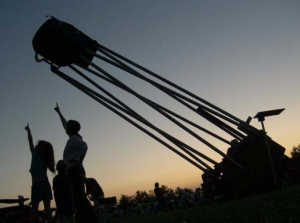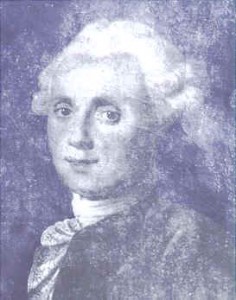
For more information on the event and the flyer – http://www.novac.com/wp/outreach/stargaze/
The Leonids is an average shower, producing up to 15 meteors per hour at its peak. This shower is unique in that it has a cyclonic peak about every 33 years where hundreds of meteors per hour can be seen. That last of these occurred in 2001. The Leonids is produced by dust grains left behind by comet Tempel-Tuttle, which was discovered in 1865. The shower runs annually from November 6-30. It peaks this year on the night of the 17th and morning of the 18th. The nearly new moon will not be a problem this year. Skies should be dark enough for what should be good show. Best viewing will be from a dark location after midnight. Meteors will radiate from the constellation Leo, but can appear anywhere in the sky.
The public night scheduled for 18 November is canceled. Although the Clear Sky Chart[1] currently says only 50% of the sky will be covered by clouds, all of the other forecasts predict “cloudy”[2] or “mostly cloudy”[3][4] with a chance of precipitation. DC television weather-guessers all agree it will be mostly cloudy tomorrow evening with differing opinions on the timing and amount of precipitation.
Hoping for clear skies for future public nights,
R. J. ‘Tree’ Greenwood
Crockett Park Site Coordinator
[1] http://www.cleardarksky.com/c/CrckttPrkVAkey.html
[2] https://www.accuweather.com/en/us/midland-va/22728/hourly-weather-forecast/2111280?hour=40
[3] https://weather.com/weather/hourbyhour/l/22728:4:US
[4] https://www.wunderground.com/hourly/us/va/midland/date/2017-11-18?cm_ven=localwx_hour
Please read the C.M. Crockett Page for park details.
The Geminids is the king of the meteor showers. It is considered by many to be the best shower in the heavens, producing up to 120 multicolored meteors per hour at its peak. It is produced by debris left behind by an asteroid known as 3200 Phaethon, which was discovered in 1982. The shower runs annually from December 7-17. It peaks this year on the night of the 13th and morning of the 14th. The waning crescent moon will be no match for the Geminids this year. The skies should still be dark enough for an excellent show. Best viewing will be from a dark location after midnight. Meteors will radiate from the constellation Gemini, but can appear anywhere in the sky.
Please read the C.M. Crockett Page for park details.
The Ursids is a minor meteor shower producing about 5-10 meteors per hour. It is produced by dust grains left behind by comet Tuttle, which was first discovered in 1790. The shower runs annually from December 17-25. It peaks this year on the the night of the 21st and morning of the 22nd. The crescent moon will set early in the evening leaving dark skies for optimal observing. Best viewing will be just after midnight from a dark location far away from city lights. Meteors will radiate from the constellation Ursa Minor, but can appear anywhere in the sky.
The Quadrantids meteor shower can yield as many as 40 meteors per hour, radiating from the constellation Bootes. It peaks this year on the night of the 3rd and morning of the 4th. Bummer though: this will occur during a nearly full moon, so all but the brightest meteors will be washed out. Still, looking up at the sky isn’t a bad way to start the new year!

A nasty wintery mix of rain, sleet, freezing rain and/or snow tomorrow afternoon and evening isn’t suitable for telescopes, astronomers or the general public.
Hoping for Clear skies for future dates,
Tree Greenwood
Crockett Park Site Coordinator
Please read the C.M. Crockett Page for park details.

Please read the C.M. Crockett Page for park details. Details will be updated for the Messier Marathon too!


